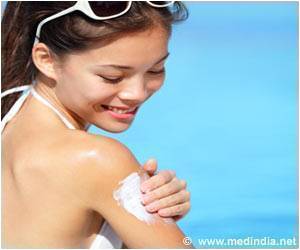Sunscreen can be defined as a kind of ‘lotion, spray, gel or other topical product that absorbs or reflects some of the sun's ultraviolet (UV) radiation on the skin exposed to sunlight and thus helps protect against sunburn’.
Sunscreen is also known as sun tan lotion, sun block, or sunburn cream. Generally sunscreens have one of the following components:1. Inorganic compounds such as zinc oxide or titanium dioxide that can scatter, reflect, and absorb harmful UV rays.
2. Organic compounds capable of absorbing ultraviolet rays.
Sunburn is primarily caused by UVB. However, both UVB and UVA can cause sunburn, skin cancer, and premature skin aging.
SPF refers to Sun Protection Factor and is defined as ‘the amount of light that induces redness in sunscreen-protected skin, divided by the amount of light that induces redness in unprotected skin’. Therefore, SPF is basically a measure of UVB protection and its rating denotes the time taken to sunburn if one is not using sunscreen as against time taken if using sunscreen.
SPF30+ protects against UVB rays responsible for causing sunburn, up to 96.7 percent.
Sufficient protection against UVB rays can be achieved by increasing SPF from 30+ to 50+ and it was made clear that all sunscreen will have to raise SPF level in order to achieve protection against ultraviolet (UVA) rays.
Dr. Goodman added, "Our understanding of UVA has improved along with the testing. We now know UVA sets up immuno-suppression and the chance of getting skin cancer. UVA is the main cause of sun-induced skin ageing."
Sunscreens with SPF50+ are quite common in Britain and Europe. With the new approved SPF standards, Australia too, has joined the elite group of SPF50+ approved nations, along with the United States.
As per FDA regulation, sunscreen products with SPF values higher than 50, have to be labeled as SPF 50+. However, FDA does not have adequate data demonstrating that products with SPF values higher than 50 provide additional protection compared to products with SPF values of 50.
In Australia sunscreen are treated as mere toiletries instead of medicines. According to the manufacturers, the increased SPF has led to hike in the prices of sunscreen by 10 percent.
Alan Oppenheim, the Managing Director of Ego Pharmaceuticals, expressed his doubts by saying, "Many products on the market are already offering greater protection than SPF30+. We know this. We could let dermatologists know and pharmacists know this but until now we couldn't let the consumer know."
Dr. Goodman said that renowned brands such as La Roche-Posay and L'Oreal's Lancome have also re-launched their products with SPF50+. Jen Makin, the SunSmart Manager at Cancer Council Victoria, firmly stated that no one should harbor any doubts regarding the use of SPF30+ sunscreen. He said that sunscreen with SPF30+ have an edge over the regular ones as they provide better protection against UVA rays of sun.
It was in 1997 that the standard of sunscreen was changed from SPF15+ to SPF30+. According to Professor Diona Damian of the Royal Prince Alfred Hospital, ‘the latest change is definitely an overdue step, but not a radical one’. Professor Damian is of the opinion that the new improvised sunscreen will enable people to differentiate better products form good ones and be sure of the fact that they are getting best protection against harmful radiation.
Australia has the highest number of skin cancer deaths but the increased SPF might be effective in decreasing the harmful effects of UVA on skin and prevent development of skin cancer.
Source-Medindia











